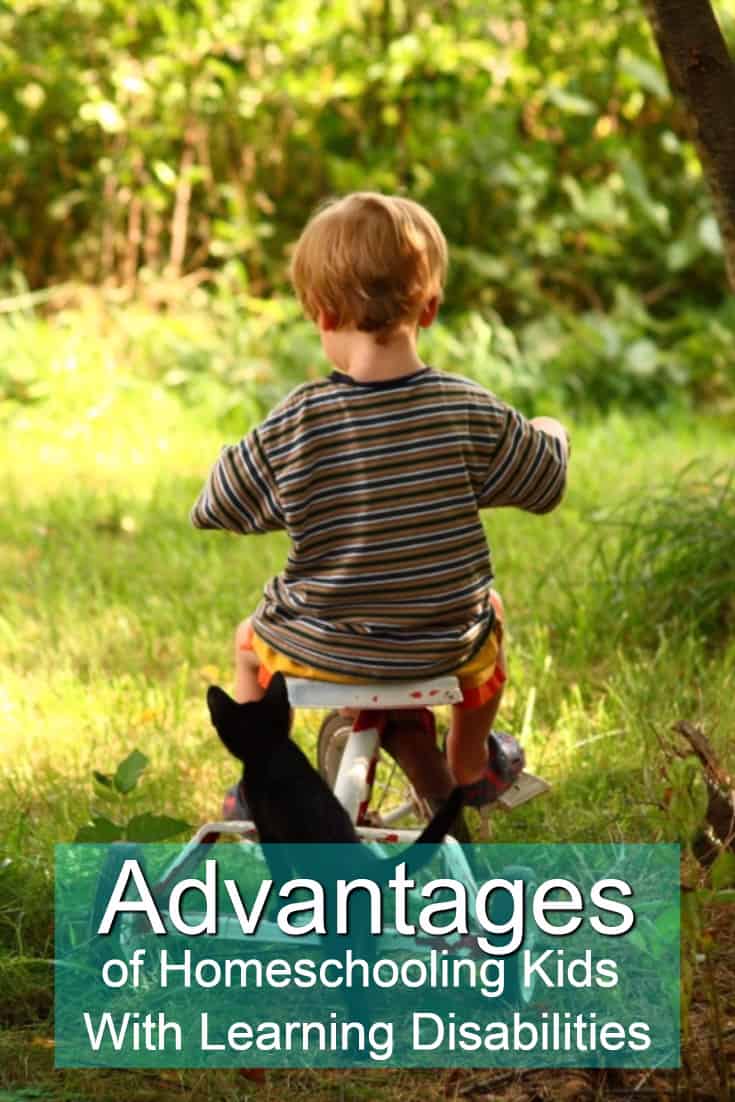Advantages of Homeschooling Kids With Learning Disabilities

Through the years, I have had the privilege of spending time with countless different children. Each was unique in their approach to life and learning. Although it is I who was their teacher at the time, I feel that it is I who learned the most. They have all taught me how to teach them. They have challenged and stretched me, and I feel that I have grown from having the pleasure of watching them achieve the seemingly impossible.
Learning Differences
These children all had one thing in common; they had what society calls a learning disability. Now, I believe that these children each had learning differences; that is, they all learned in different ways, but they all learned. So I never fell into the belief that they did indeed have learning disabilities and I never allowed them to think that they were any different than any other child.
The truth is that we all learn differently.
We are all unique and special in some way, and we all have much to give to others.
Public School Separation
These learning differences presented themselves in many ways. I have dealt with dyslexia, ADHD, speech impediments, and autism spectrum disorders. Some of the children I worked with attended public school. There, they were put into classes that were meant to address their learning differences individually. Some of them felt isolated because they learned differently than their peers and were separated from them.
The homeschooled children never experienced this isolation and separation because they were simply allowed to learn in the ways that made sense to them and at a pace that worked for them. They were surrounded by the family who loved them and accepted them every day, and this is also the environment in which they learned. It is an environment that makes room for mistakes and treasures them for who they are.
Homeschool Advantages
Each of these children benefited from an individualized approach to learning.
Whether it was in a public school environment or a homeschool one, the children were taught in a way that best suited their needs. Tailoring the lessons and approach to your child is something that most parents do with their homeschooled children anyway, so it just makes sense that this would be a great environment for children with learning disabilities.

1. Plenty of One-On-One Time
Homeschooled children have access to all of the one-on-one time that they need. This is especially important when dealing with children who need to learn at a slower pace or in a particularly systematic way. When I worked with children with autism, there was a very specific process that we went over each day and built upon it. This took lots of time and patience. It was just the two of us which is exactly what he needed.
2. Spending Time with Parents
Homeschooling can be a great choice for a child with learning disabilities. They spend every day with the person who knows them better than anyone; their parent. Parents know when to take breaks and they know when to laugh. They know when an approach is just not working and when to change it. They’ve seen a child at their best and worst and are able to read the cues before the child becomes frustrated and just wants to give up.
3. Room for Trial And Error
Sometimes what I tired with these children worked wonderfully, and we would both clap our hands and cheer at their hard-earned success. Sometimes, despite both our efforts, things just didn’t work and we’d find ourselves back at square one. This is where homeschooling is so great. If one thing doesn’t work, just try something else. There is no set curriculum that you must follow and no one to answer to but each other. You just simply keep trying until something works.
4. Learning at Your Own Pace
Like a lot of other homeschoolers, we don’t pay much attention to grade levels in our home. Sometimes my kids even forget what grade they are in. There is the ever-present goal of learning daily, even moment by moment. As long as we are learning, we don’t care how fast or slow the process is. Sometimes, kids with learning differences need to be able to accomplish things in their own time. Homeschooling not only allows for this approach but is perfect for it.
5. No Peer Pressure
In our family, everyone is different, or as we like to say, everyone is weird. There is no peer pressure in the homeschool environment. There is no one else to compare to except your weird brother, and he doesn’t count. There are no labels and, in our family, children with learning differences never even know it. Everyone in the family learns differently. Some use audio books while some prefer real ones. Some like noisy hands-on and other quietly sit in their rooms and learn. The bottom line is to create an environment where there is no “normal.”
6. Music & Special Needs
Did you know there is a surprising connection between music and autism?
Click here to read more from TakeLessons.More and more parents and teachers of special needs children are starting to realize the remarkable connection between music and autism. Research has shown that when autistic children interact with music on a regular basis, their communication and behavior improve.
— TakeLessons [source]
It’s Okay to Ask for Help
One final word: Teaching kids with learning disabilities can be challenging, and you will not always have the answers. It is normal to ask for help, even if you are a homeschooler. There have been many times when I did extensive research to help these kids and was still unable to.
Some people are trained to deal specifically with your child’s needs, and that is such a relief to know when you have already done your best. It’s up to you as a homeschool parent to see that your child is educated, not only to educate them yourself. There should be no shame in getting help, there should only be honor.
Homeschooling can be a great choice for any child, but it can be the perfect choice for a child with a learning difference. They can be allowed to learn how they need to in an environment that is completely tailored to them. Remember, we are all different. God doesn’t need us all to be the same.







Leave a Reply